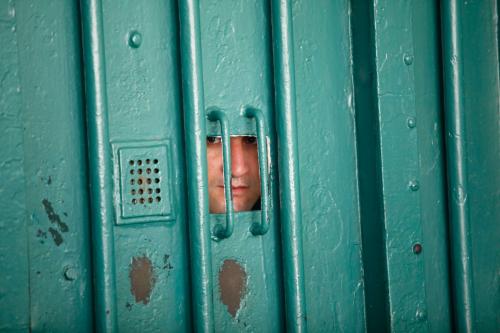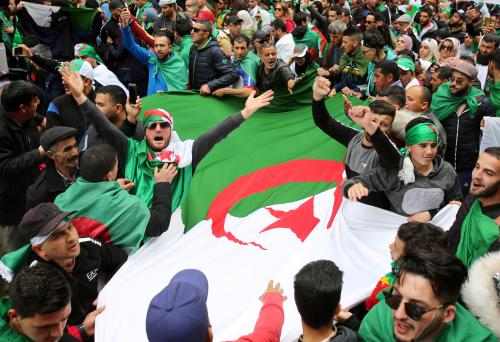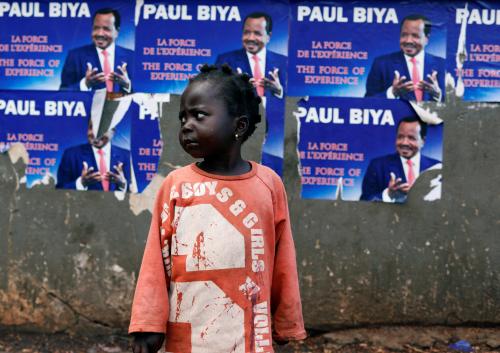On June 2, Algeria’s constitutional council cancelled the July 4 presidential elections, which were constitutionally mandated to replace ousted President Abdelaziz Bouteflika. The cancellation of elections is a win for protesters, who had rejected the “constitutional” path imposed by the regime. With their cancellation, Algeria will enter a constitutional vacuum and with it, political uncertainty on the road ahead. However, unshackling the transition from the existing constitution will also provide an opportunity for a more genuine transition to democracy.
Since Bouteflika’s ousting on April 2, the remnants of the Bouteflika regime had invoked Article 102 of the constitution, which necessitated presidential elections within 90 days of Bouteflika’s resignation (July 9). As also mandated by the constitution, President of the Senate Abdelkader Bensalah became the interim president, while the government at the time—led by Prime Minister Noureddine Bedoui—could not be changed.
The regime, led de facto by army chief Ahmed Gaid Salah, claimed that this roadmap was the legitimate and constitutional path forward. But as the protesters had observed, this path was also the one most likely to allow the reconsolidation of the Bouteflika regime. The figures shepherding the “transition”—Bensalah, Bedoui, and to a greater extent, Gaid Salah—were all holdovers from the Bouteflika regime. Moreover, the 90-day transitional period provided no guarantees of free and fair elections nor meaningful time for the protesters to organize politically. As the result, the protesters rejected the “constitutional” path en masse every Friday since Bouteflika’s ouster. They instead invoked Articles 7 and 8 of the constitution, which observe that political power derives from the people.
In the face of this popular rejection, only two relatively unknown candidates put forth their names to run in the July 4 presidential elections. The constitutional court on June 2 then rejected those two candidacies and declared that the elections would be impossible to hold. As a result, Algeria will not see elections within 90 days of Bouteflika’s ouster, and the constitutional path will be unmet.
These developments will likely tip the balance of power in favor of the protesters. The regime’s preferred strategy appears to be to ask interim President Bensalah to remain in office beyond his July 9 end date, and task him, as the constitutional council did, with organizing elections at a later date. But the regime will no longer be able to use a shroud of constitutional legitimacy to impose this preferred roadmap. Such an extension of the 90-day period is unconstitutional.
Without the constitution, the sole source of legitimacy will be the street.
Without the constitution, the sole source of legitimacy will be the street, and the protesters are certain to reject an extension of the previous roadmap. The only solution out of the coming political crisis, as Gaid Salah himself recognized, would be through dialogue between the regime and the protesters.
The cancellation of the elections not only makes negotiations more likely, but also removes arbitrary constraints from those negotiations. With the constitutional path void, the constitution can no longer be used as a “straitjacket”—to use the words of Georgia State University’s Rochdi Alloui—to limit the possible options. Now, the regime can no longer use the constitution to prevent the removal of the 2Bs—President Bensalah and Prime Minister Bedoui—and a national unity government can instead be formed.
The United States and the international community should encourage the regime to negotiate with the protest movement, and to meet their demands. These demands likely include a revision, if not rewriting, of the constitution and the creation of independent institutions to guarantee the credibility of presidential, parliamentary, and municipal elections.
For these negotiations to be accepted and respected, the protesters will need to organize and choose leaders they find credible to negotiate on their behalf. But as important for the transition are the representatives the regime chooses. While the military cannot be ignored, it is important that it not chair or preside over the negotiations, which would legitimize the military as a political actor and as the referee of the upcoming transition.






Commentary
The cancellation of Algeria’s elections is an opportunity for democratization
June 4, 2019